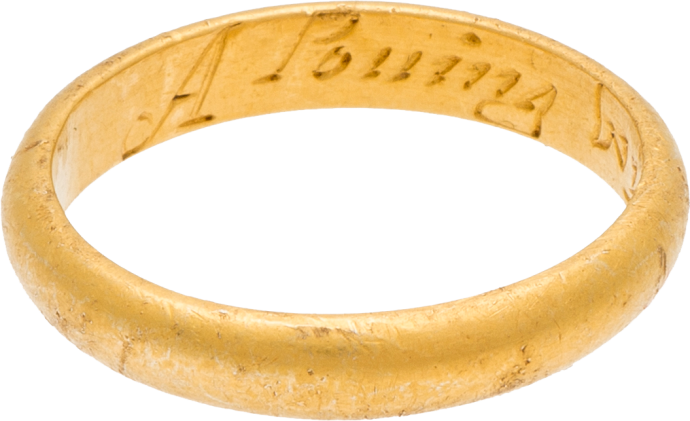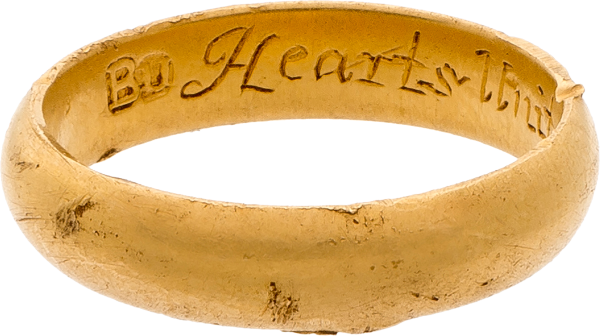


Posy Ring, "A loving wife during life"
, mid-18th century


Posy Ring, "A loving wife during life"
Description
"Posy rings," their name deriving from the term poésie or poetry, have mottoes or inscriptions on a plain gold band. In many instances these messages of loyalty and love are concealed inside the hoop, and its content was known only by the wearer and giver. Such rings find mention in the plays of William Shakespeare, such as Hamlet and the Merchant of Venice. By the seventeenth and eighteenth centuries posies on rings enjoyed great popularity, and they were customarily exchanged between friends, relatives, and lovers, as well as during betrothal and wedding ceremonies. The inscription on this ring suggests it was presented on the occasion of a marriage ceremony, which at the time was either contracted inside or outside of a church setting. A ring with the motto "A loving wife during life" expresses mutual consent to a life, as said during the marriage vows, "until death do us part."
The gold hoop with D-section has the inside the engraved inscription 'A loving wife during life' in italic script. The rectangular punch with maker's mark has the initials 'IV'. The maker's mark can tentatively be attributed to John Vickerman, a small worker, who registered his mark in London in 1768 (see: Grimwade 1990, no. 1731). The hoop shows on the outside signs of wear through age and is in good wearable condition.
Literature:
Joan Evans records in her compendium of posy rings several variations of the motto (Evans 1931, p. 18), such as "A loveing wife a Happy Life" or "A loving wife prolongeth life." Rings with the posy inscription "A loving wife a Happy life" appears on one in the British Museum (Dalton 1912, no. 1108, inv. no. AF. 1189) and in the Fitzwilliam Museum, Cambridge (PERM.M. 321-1923). See also "As long as life yr loving wife," in: Kunz 1917, p. 242. For a history of posy rings with extensive list of posies, see Evans, 1931 and Anon., A Garland of Love: A Collection of Posy-Ring Mottoes, London 1907. For further information, see Dalton 1912, p. 174 ff.; Scarisbrick 2007, p. 74 ff., Taylor and Scarisbrick 1978, and Oman 1974, p. 39 ff..
